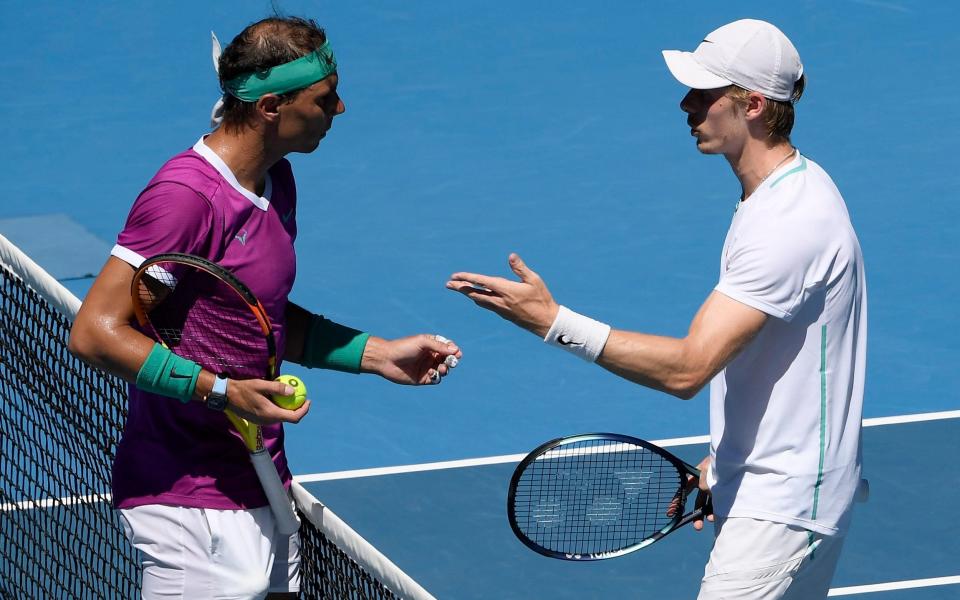Short tugs, shoulder taps and water bottles – the Rafael Nadal rituals that really wind up his opponents

Attempting to track all the rituals Rafael Nadal goes through during a match of tennis is almost as difficult as beating him. If watching him complete his bewildering array of tics and superstitions can be exhausting, playing against him must be infuriating, as Denis Shapovalov made clear today.
As soon as Nadal steps into an arena, the process begins. Tennis racket in hand, walk to the chair, and set up the work station. Align each bottle of water and energy drink just so, ensuring the labels are facing a certain direction. Adjust both socks to the exact same height. Jump up and down during the coin toss. Sprint to the baseline ahead of the warm-up. When the match begins, walk to the service line, all while avoiding stepping on any lines on the court. Only step over the lines when leading with the right foot (and do not be afraid to add a short, awkward hop-step to avoid any errors on this front).
Then comes the service routine. Pick out wedgie in shorts. Tap left shoulder, right shoulder. Tuck hair behind left ear. Wipe sweat off nose. Then repeat with the other ear, before returning to the nose again - all while bouncing the ball a set number of times. If the first serve is missed, do it all again - minus the shoulder taps - for the second serve.
Rafael Nadal's pre-serve routine and a volley winner. #AusOpen pic.twitter.com/mxlTQ6JsYh
— Tennis Memes (@ATPWTAMemes) January 19, 2017
Between each point, wipe sweat off arms with a towel. During the change of ends, always let the opponent cross the net to their seat first - as obsessive as Nadal is, nobody could accuse him of bad manners.
Gamesmanship is another matter, however. On that front, he has a long list of complainants, especially in relation to timekeeping. Opponents have been continually irked by the way he seems to avoid being held to account by the serve clock - a device first introduced in 2018, and which counts down the 25 seconds in which players must serve, with umpires pushed to enforce time violations more consistently.
Nadal should be public enemy number one on this front, known throughout his career for taking liberties when it comes to the time spent between points. But he is rarely officially chastised by umpires for doing so, and some players see Nadal's status - as a 20-time major champion and a member of the esteemed so-called 'Big Three' - as helping him avoid such reprimands.
At Wimbledon in 2019, Nick Kyrgios shouted at the umpire to take action against Nadal. "Tell him," Kyrgios said. "It's only taken you 20 years - all of you - to tell him."
Even Roger Federer has voiced frustrations. “I don’t know how you can go through a four-hour match with Rafa, and he never gets a time violation," Federer said in 2012, adding that it does not make for an enjoyable fan experience.
Though he has made some minor adaptations over the years - like getting back on court between changeovers on time, and only using one towel to wipe down his sweat between points - Nadal has not been put off his extensive rituals by rule changes or opposition.
He was vocal about his disdain for on-court service clocks when they were introduced, and has even disputed umpire decisions on the rare occasions he receives a violation.
“All the matches that have been important in the history of our sport have been four hours, five hours," he said in 2018. "To play these kind of matches, you need time between points because you cannot play points in a row with long rallies, with emotional points, having only 25 seconds between.”
In fact, his routine has grown more elaborate over time. Now that ball boys and girls cannot handle players' sweat-drenched towels, due to Covid-19 protocols, Nadal has taken to laying out his towel in between points neatly, with the same precision he shows to every other ritual. During Tuesday's quarter-final against Shapovalov, he bizarrely walked to his chair backwards, in another apparent superstitious move.

As much as it bothers some of his opponents, he has insisted in the past that his odd ways are not about affecting the player on the other side of the court, nor about superstition. "It’s a way of placing myself in a match, ordering my surroundings to match the order I seek in my head," he said previously.
His behaviour is not likely cynical, more about his own rhythm and mindset than his opponents'. But Shapovalov cannot be blamed for letting it get under his skin, and ultimately it was that which proved his undoing in Melbourne.
